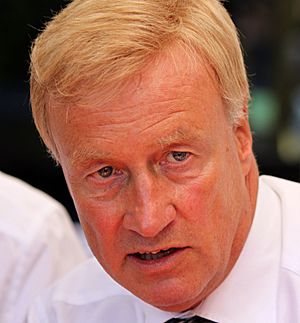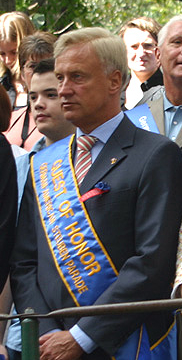Ole von Beust facts for kids
Quick facts for kids
Ole von Beust
|
|
|---|---|

Ole von Beust in 2009
|
|
| First Mayor of Hamburg | |
| In office 31 October 2001 – 25 August 2010 |
|
| Second Mayor | Ronald Schill Mario Mettbach Birgit Schnieber-Jastram Christa Goetsch |
| Preceded by | Ortwin Runde |
| Succeeded by | Christoph Ahlhaus |
| President of the Bundesrat | |
| In office 1 November 2007 – 31 October 2008 |
|
| First Vice President | Harald Ringstorff |
| Preceded by | Harald Ringstorff |
| Succeeded by | Peter Müller |
| Leader of the Christian Democratic Union in the Hamburg Parliament | |
| In office 15 December 1993 – 31 October 2001 |
|
| Preceded by | Michael Freytag |
| Member of the Hamburg Parliament | |
| In office 28 June 1978 – 17 March 2004 |
|
| Preceded by | multi-member district |
| Succeeded by | multi-member district |
| Constituency | CDU list |
| Personal details | |
| Born | 13 April 1955 Hamburg, West Germany |
| Political party | Christian Democratic Union |
| Residence | Hamburg |
| Alma mater | University of Hamburg |
| Occupation |
|
| Signature | |
Ole von Beust (born 13 April 1955) is a former German politician. He was the First Mayor of Hamburg from 2001 to 2010. This job is like being the governor of a state and the mayor of a city at the same time, because Hamburg is both a city and one of Germany's states.
For one year, from 2007 to 2008, he was also the President of the Bundesrat. The Bundesrat is a part of Germany's government where representatives from all the states meet.
Contents
Early Life and Career
Carl-Friedrich Arp Freiherr von Beust was born in Hamburg, Germany. His family was part of the old German nobility. He has always been known by his nickname, "Ole," which he later made his official first name.
In 1971, he joined the Christian Democratic Union (CDU), a major political party in Germany. After finishing high school in 1973, he began working for the CDU in the Hamburg Parliament.
He started studying law at the University of Hamburg in 1975. While studying, he was very active in politics. He was the leader of the CDU's youth group in Hamburg from 1977 to 1983. In 1978, he was elected as a member of the Hamburg Parliament. He finished his law studies in 1983 and became a lawyer.
First Mayor of Hamburg
Ole von Beust became the First Mayor of Hamburg on 31 October 2001. He led the city for three terms.
First Term (2001–2004)
During his first term, some large companies were leaving Hamburg, which meant people were losing their jobs. Mayor von Beust worked to keep important businesses in the city. For example, he helped the city buy a part of the cosmetics company Beiersdorf. This move kept the company in Hamburg and saved jobs.
In 2003, a major political event happened. Von Beust had a disagreement with his vice-mayor, Ronald Schill. This led to von Beust dismissing Schill from his position. The event caused a lot of discussion in the news.
Second Term (2004–2008)
In the Hamburg state election on 29 February 2004, von Beust's party, the CDU, won a huge victory. They received 47.2% of the vote. This was a big increase from the last election and meant the CDU could govern Hamburg by itself, without needing to form a team with other parties.
During this time, von Beust's government started one of Hamburg's most famous modern projects: the Elbphilharmonie. This is a stunning concert hall built in the HafenCity quarter, a redeveloped part of Hamburg's port.
From 2007 to 2009, von Beust was also part of a special group of 32 politicians. They worked on modernizing Germany's government and how power is shared between the national government and the state governments.
Third Term (2008–2010)
In the 2008 election, the CDU was still the strongest party but didn't win enough votes to rule alone. So, von Beust's party formed a coalition government with the Green Party. A coalition is when two or more parties agree to work together to govern. This partnership in Hamburg was seen as a test for whether the two parties could work together on a national level.
In 2009, von Beust and the leader of the neighboring state of Schleswig-Holstein had to solve a major problem. They agreed to a €13 billion plan to rescue HSH Nordbank, a bank owned by the two states that was in financial trouble.
On 18 July 2010, von Beust announced that he would resign as mayor. He officially left office on 25 August 2010.
Life After Politics
After leaving politics, Ole von Beust returned to being a lawyer and opened his own firm. He also became an advisor for a business consulting company called Roland Berger.
He has taken on many other roles as well. He helps run a foundation that supports people who have been treated unfairly for their political beliefs. He has also served on the boards of several companies and organizations.
In 2015, he was chosen to co-lead an important government commission. This group had to figure out a plan for how Germany would safely manage its nuclear waste after deciding to stop using nuclear power.
See also
 In Spanish: Ole von Beust para niños
In Spanish: Ole von Beust para niños
- List of LGBT heads of government
 | Valerie Thomas |
 | Frederick McKinley Jones |
 | George Edward Alcorn Jr. |
 | Thomas Mensah |


